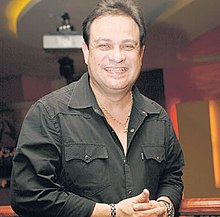
The Billboard Latin Music Awards grew out of the Billboard Music Awards program from Billboard magazine, an industry publication charting the sales and radio airplay success of musical recordings. The Billboard awards are the Latin music industry’s longest running award. The award ceremonies are held during the same week as Latinfest+.
Latin Pop Airplay is a record chart published on Billboard magazine and a subchart of the Latin Airplay chart. The chart focuses on Latin pop music, namely Spanish-language pop music. It was established by the magazine on October 8, 1994 as a subchart of the Hot Latin Songs chart until October 2012 when the Hot Latin Songs changed its methodology. The first number-one song on the chart was Mañana by Cristian Castro. This chart features only singles or tracks and like most Billboard charts, is based on airplay; the radio charts are compiled using information tracked by from Nielsen Broadcast Data Systems (BDS), which electronically monitors radio stations in more than 140 markets across the United States. The audience charts cross-reference BDS data with listener information compiled by the Arbitron ratings system to determine the approximate number of audience impressions made for plays in each daypart. With the issue dated August 15, 2020, Billboard revamped the chart to reflect overall airplay of Latin pop music on Latin radio stations. Instead of ranking songs being played on Latin-pop stations, rankings will be determined by the amount of airplay Latin-pop songs receive on stations that play Latin music regardless of genre. The current number-one song on the chart is "Copa Vacía" by Shakira and Manuel Turizo.
The Tropical Airplay chart is a record chart published by Billboard magazine introduced in 1994. The first number-one song on the chart was "Quien Eres Tu" by Luis Enrique. Originally, rankings on the chart were determined by the amount of airplay a song received on radio stations that primarily played tropical music, namely music originating from the Spanish-speaking areas of the Caribbean such as salsa, merengue, bachata, cumbia, vallenato, and tropical fusions. Any song, regardless of its genre, was eligible for the chart if it received enough airplay from the panel of tropical music radio stations being monitored.

"Y Hubo Alguien" is a song by American singer Marc Anthony from his third studio album, Contra la Corriente (1997). The song was written by Omar Alfanno, with record production being handled by Ángel "Cucco" Peña. It was released as the first promotional single from the album in 1997. A salsa song which combines elements of R&B, it describes a man who has found love again after his former lover left him. The song was inspired by a fight Alfanno had with his partner and pitched the song to RMM, but was turned down. Anthony offered to record the track after Alfanno presented it to him.

"Mi Forma de Sentir" is a song by La Revolución de Emiliano Zapata and written by the band's front man Javier Martín del Campo from their 1979 album of the same name.
"Hay Que Poner el Alma" is a song written by Omar Alfanno and performed by Puerto Rican singer Víctor Manuelle on his 1996 self-titled studio album and was released as the lead single from the album. It became his first number song on the Tropical Airplay where it spent six weeks on this position and was the second best-performing tropical song of 1996. José A.Estévez, Jr. of AllMusic listed the song as one of the album's highlights. "Hay Que Poner el Alma" won "Tropical Song of the Year" at the 1997 SESAC Latin Music Awards which was presented to Alfanno.
"Tú Cómo Estás" is a song written by Gustavo Márquez and performed by Domingo Quiñones on his studio album Mi Meta (1996). In the song, the artist wonders how his former love is doing and if she misses him. It became his first and only number one song on the Tropical Airplay in the US where it spent two weeks on top. José A.Estévez, Jr. of AllMusic called it "among the singer's finest moments" and praised the arrangement by Ramón Sánchez. It was recognized as recognized as one of the best-performing songs of the year at the 1997 ASCAP Latin Awards on the tropical field.
"Esperaré a Que Te Decidas" is a song written by Mary Lauret and performed by Puerto Rican salsa singer Tony Vega on his studio album on his 1996 self-titled studio album and was released as the lead single from the album. It became his first and only number one song on the Tropical Airplay chart. It was recognized as recognized as one of the best-performing songs of the year at the 1997 ASCAP Latin Awards on the tropical field.

"Loco de Amor" is a song by Puerto Rican singer Jerry Rivera from his seventh studio album Fresco, (1996). The song was written by Mary Lauret and produced by Sergio George and Cuto Soto. It is a salsa tune, in which Rivera confesses that he is crazy in love. The song received positive from music critics, being identified by them as a standout from the album. It was nominated for the Tropical Song of the Year award at the 9th Annual Lo Nuestro Awards in 1997 and was a recipient of the ASCAP Latin Award in the tropical field in the same year. In the United States, "Loco de Amor" reached number 11 on the Billboard Hot Latin Songs chart and topped the Tropical Airplay chart, spending eight weeks at this position on the latter chart. A music video for the song was filmed in a barn.

"Dile a Ella" is a song written by Gil Francisco and performed by Puerto Rican salsa singer Víctor Manuelle on his fourth studio album A Pesar de Todo (1997). It was released as the lead single from the album. In the song, the singer asks his friend to tell a woman that he loved that he cannot forget her. It became his third #1 hit on the Tropical Airplay chart and spent nine weeks week on top, making it the longest-running tropical song of 1997. José A. Estévez, Jr. called it a tune that "bristles with uninhibited energy". Paul Verna of Billboard cited the song as one of the album's "amorous ditties". "Dile a Ella" was also listed on Billboard's "Best 15 Salsa Songs Ever". "Dile a Ella" won a BMI Latin Award in 1999.
"Que Habría Sido de Mí" is a song written by Omar Alfanno and performed by Puerto Rican singer Víctor Manuelle on his fifth studio album, Ironías(1998), and was released as the second single from the album. It became his seventh number song on the Tropical Airplay chart. AllMusic critic José A.Estévez, Jr. cited it as one of the songs from where the album where Ramón Sánchez's arrangements allows Manuelle to "drive the best of the talented improviser, belting it out with all his might". This sentiment was shared by Billboard editor John Lannert who called it one of the album's "well-crafted tracks". Parry Gettelman praised the performance of both the bassist and the pianist in the track. On the former, she noted that Ruben Rodriguez "provides a graceful bass line that subtly builds tension released in the soaring chorus". It was nominated "Tropical/Salsa Hot Track of the Year" at the 1999 Latin Billboard Music Awards, but lost to "Suavemente" by Elvis Crespo. In 2000, it was recognized as one of the best-performing songs of the year at the American Society of Composers, Authors and Publishers Awards under the salsa category.

"Pero Dile" is a song written and performed by American singer Víctor Manuelle on his sixth studio album, Inconfundible (1999). It was released as the album's lead single in 1999 by Sony Discos. The song's production was handled by Sergio George while it arrangements was done by Ramón Sanchez. "Pero Dile" is one of the album's salsa songs and narrates the singer telling his ex to tell people that he was a bad lover and admits to being at fault. The track received positive reactions from two music critics who praised the song's arrangement and Manuelle's performance. "Pero Dile" was nominated in the category of Tropical/Salsa Hot Latin Track of the Year at the 2000 Billboard Latin Music Awards and was a recipient of the American Society of Composers, Authors and Publishers (ASCAP) Latin Award in 2000. Commercially, it reached number three on the Billboard Hot Latin Songs and topped the Tropical Airplay chart in the United States, where it spent 11 weeks at number one.

Que Suenen los Tambores is the sixteenth studio album by Puerto Rican singer and songwriter Víctor Manuelle, released on April 21, 2015, through Kiyavi Corp. and Sony Music Latin. It was produced by Arbise "Motiff" Gonzalez, and features a collaboration with Puerto Rican singer Raquel Sofía in one of the bonus tracks.










